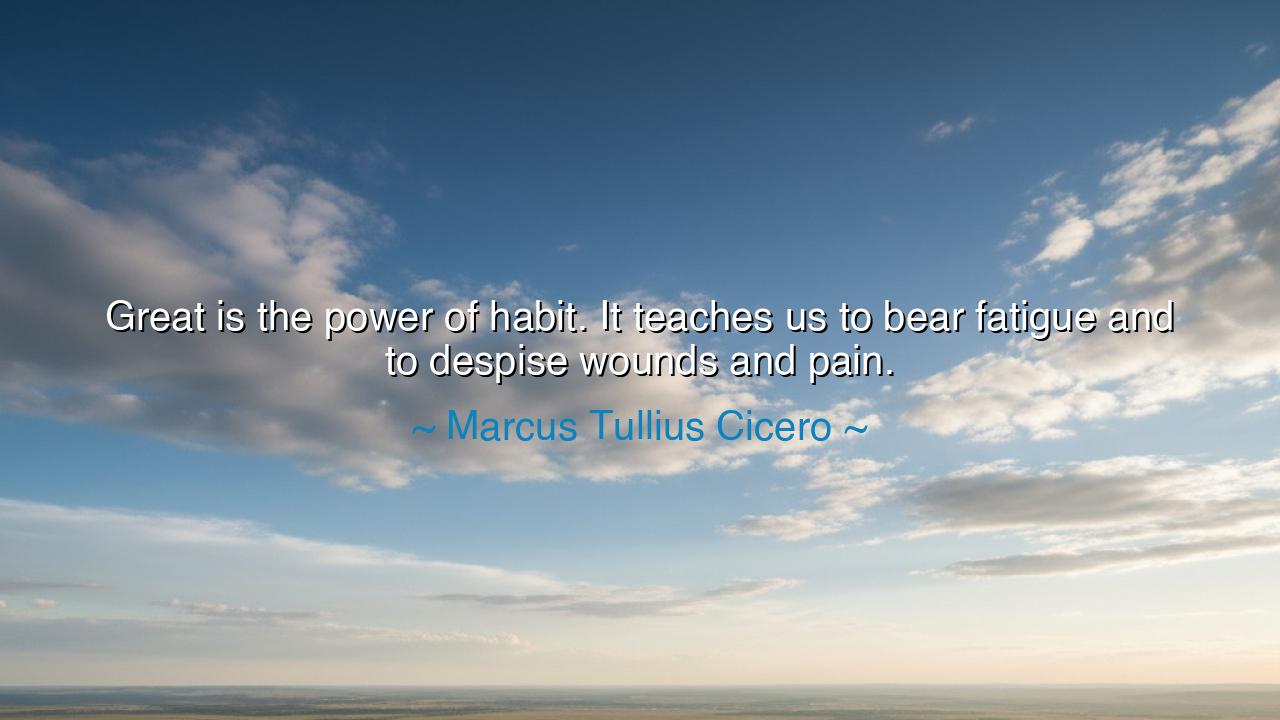
Great is the power of habit. It teaches us to bear fatigue and
Great is the power of habit. It teaches us to bear fatigue and to despise wounds and pain.






In this timeless teaching, Marcus Tullius Cicero, the great Roman orator and philosopher, speaks of the mighty force of habit. He declares, “Great is the power of habit. It teaches us to bear fatigue and to despise wounds and pain.” These words reveal a profound truth: through repeated actions, the mind and body are trained to endure hardship. What once seemed unbearable becomes natural, and what once brought suffering becomes a source of strength. Habit, like a silent master, shapes our destiny by forging resilience within the soul.
The origin of this wisdom lies in the discipline of the ancient world. Cicero, living in an era of warriors, philosophers, and statesmen, witnessed how repeated practice transformed ordinary men into heroes. Roman soldiers marched for days under the scorching sun, their feet blistered and their bodies aching. Yet through relentless training, they grew accustomed to pain, moving as one unstoppable force. It was not merely physical strength that carried them forward, but the invisible hand of habit, which hardened their spirits against fear and weakness.
History offers a vivid example in the tale of Spartan warriors. From childhood, they were subjected to rigorous trials—cold nights, meager meals, endless drills. At first, such suffering seemed cruel, but over time, it forged men who could face the horrors of battle without flinching. When the three hundred Spartans stood at Thermopylae, they did not tremble before the vast Persian army, for habit had taught them to despise wounds and pain. Their endurance was not born in a single moment of courage, but in countless small acts of perseverance over many years.
Cicero’s wisdom also extends beyond the battlefield. In the realm of the mind, habit is equally powerful. The philosopher who disciplines his thoughts daily learns to remain calm amidst chaos, just as the artist who practices his craft tirelessly achieves mastery. Even in modern times, this truth holds: athletes, musicians, and leaders all draw strength from routines that sharpen their focus and deepen their resolve. Through steady repetition, the impossible becomes possible.
Yet, Cicero’s words carry both promise and warning. Just as good habits lead to greatness, destructive habits can chain the soul in misery. A man accustomed to idleness will shrink from effort, while one accustomed to vice will no longer feel shame. Thus, it is vital to choose habits wisely, for they shape not only our actions, but our very character. As the ancients taught, we first make our habits—and then, our habits make us.
Let this teaching be passed down to future generations: habit is a silent yet mighty force, a weapon in the hands of the disciplined and a prison for the careless. If cultivated with intention, it gives us the power to endure fatigue, to rise above pain, and to face life’s trials with unshakable courage. Through habit, even ordinary mortals may walk the path of heroes.






HHHuy Ha
Cicero’s view on habit is intriguing, especially when considering the role of habit in overcoming discomfort. But how far can habit take us in terms of resilience? Is there a point where the endurance built by habits may cause us to ignore real signs of distress or pain? Should we be careful not to glorify pushing through fatigue without listening to our bodies and minds? How do we find the balance between resilience and self-care?
NTMinh Thuong Nguyen Thi
This quote by Cicero is a powerful reminder of how powerful habits can shape our response to adversity. It raises an important question: how do we develop habits that strengthen us rather than harm us? Can all habits help us push through fatigue, or are there habits that we should reconsider because they make us ignore our own limitations or signs of burnout? How can we cultivate habits that genuinely help us thrive without pushing us to unhealthy extremes?
GBDo Quoc Gia Bao
Cicero’s observation on habit reminds me of the ways we get used to things over time, even things that seem uncomfortable or painful at first. But is it always beneficial to have the power of habit make us bear fatigue and wounds? Could there be situations where too much reliance on habit prevents us from addressing problems or seeking help? How do we distinguish between healthy endurance and unhealthy suppression of our needs or discomforts?
BNHuynh Tran Bao Nhu
Marcus Cicero’s quote highlights the strength of habit in overcoming fatigue and discomfort, which got me thinking: is this a healthy form of resilience, or does it sometimes encourage us to ignore our limits? Can we sometimes push ourselves too far simply because we’ve built the habit of enduring pain? How much of our mental or physical endurance is truly a result of habit, and how much comes from conscious effort and awareness of our own boundaries?
HNHien Nguyen
Cicero’s statement about the power of habit is thought-provoking. It makes me think about how much our daily routines shape our ability to endure challenges. Can habit truly make us more resilient to pain and discomfort, both physically and emotionally? Are there aspects of our lives where we rely on habit to push through tough times, even when we might otherwise feel like giving up? I wonder if this resilience always serves us well or if it can sometimes blind us to deeper issues.